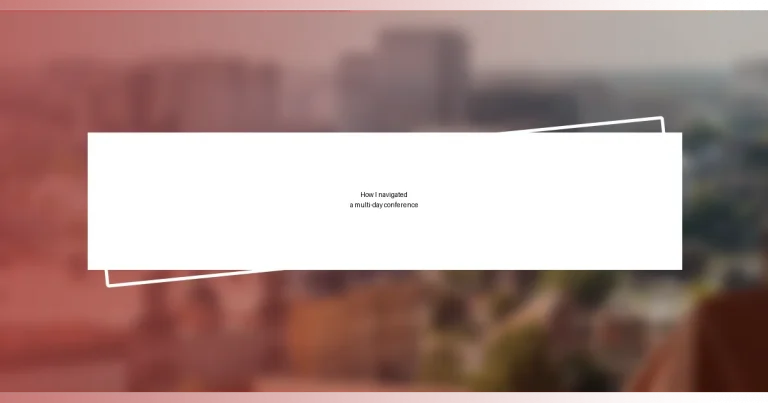Key takeaways:
- Preparing for a conference involves organizing essentials, setting clear goals, and familiarizing oneself with the agenda to make the most of the experience.
- Effective networking is built on active listening and personalizing follow-up communications to strengthen newly formed relationships.
- Reflecting on experiences post-conference helps solidify learnings and identify areas for growth, enhancing future participation in such events.

Preparing for the conference
Preparing for a conference is like gearing up for a marathon. I still remember the little jitters I had the night before my first multi-day event, wondering if I had packed everything I needed. Did I forget my business cards? A good night’s sleep is crucial, but so is being organized; I found that laying out my essentials the evening before made all the difference.
The next step for me was establishing my conference goals. Why was I attending? Was it to network, learn something new, or find potential collaborators? I recall jotting down my key objectives in a notebook, which not only kept me focused but also helped me prioritize sessions. Reflecting on this now, I can’t help but ask: have you ever entered a conference without a clear purpose? It can lead to aimless wandering, which is the last thing you want at such a bustling event.
Lastly, I discovered that familiarizing myself with the agenda in advance was invaluable. I took the time to highlight sessions that really sparked my interest and even planned out my downtime. This forward-thinking approach allowed me some breathing room to chat with new contacts or simply grab a coffee and recharge. I learned that the best connections often happen in those relaxed moments—don’t you think that sometimes, the spontaneous conversations are the most memorable?

Setting conference goals
Setting meaningful goals before a conference can truly shape your experience. Ive found that taking a moment to define your objectives not only sets a clear path but also helps you filter the noise of the event. For instance, my first conference, I aimed merely to collect business cards. Yet, I quickly realized that establishing deeper connections was far more rewarding than just focusing on quantity.
Another aspect I’ve come to appreciate is the importance of flexibility in your goals. Initially, I was laser-focused on attending workshops to gather information. However, I stumbled upon an informal gathering that sparked intriguing discussions and unexpected partnerships. I still think about how sometimes the best opportunities arise from being open to spontaneous moments.
To streamline your focus during the event, I recommend creating a priority list based on your goals. When I started to list sessions, networking opportunities, and even potential follow-ups afterwards, it transformed my approach. This method helped me stay accountable to my objectives, ensuring I capitalized on the most relevant opportunities during those hectic days.
| Goal Type | Example |
|---|---|
| Networking | Connect with at least five industry leaders |
| Learning | Attend sessions on emerging trends |
| Collaboration | Identify potential partners for future projects |

Organizing your schedule
Organizing your schedule can genuinely elevate your conference experience. The first time I attended a multi-day event, I learned the hard way that haphazard planning leads to missed opportunities and feeling overwhelmed. I remember glancing at my agenda in the wee hours, only to realize I had double-booked myself for a networking event and an insightful workshop. It was a chaotic moment! Now, I always set aside time to map out my schedule rigorously. This includes not just the sessions I want to attend, but also strategic breaks to recharge and process information.
To effectively organize your schedule, consider the following steps:
- Highlight Key Sessions: Mark sessions that truly resonate with your goals.
- Plan Short Downtimes: Schedule brief breaks to clear your mind and reconnect with peers.
- Create a Backup Plan: Sometimes schedules change; have alternative sessions in mind.
- Sum Up Daily Goals: Each day, establish what you want to achieve, even if it’s just making one meaningful connection.
By employing these tactics, I find I can navigate a conference with renewed purpose and energy, making the experience not just productive but genuinely enjoyable.

Networking effectively at events
Networking at events can be a game-changer. I remember one specific conference where I approached a group casually discussing a panel topic that intrigued me. Instead of sticking to the usual small talk, I jumped in with my thoughts, and before I knew it, we were deep in conversation. That spontaneous interaction not only led to valuable insights but also cultivated a budding friendship that has enriched my professional life ever since.
A great networking strategy I’ve adopted is to actively listen rather than just waiting for my turn to speak. This approach completely shifts the dynamic. For example, during a coffee break, I met a fellow attendee who shared a challenge they were facing in their work. I asked a couple of open-ended questions, and it turned out my expertise aligned perfectly with their needs! The exchange not only allowed me to offer genuine help but also built trust between us, making the connection feel authentic and significant.
When it comes to following up after the event, I find that personalizing my messages makes all the difference. Instead of a generic “Nice to meet you,” I reference our conversation or a specific insight they shared. I once sent a quick note to someone I met at a networking lunch, referencing a book recommendation they had made. Not only did it start an engaging dialogue, but it also kept the connection warm. Isn’t it fascinating how little touches like these can transform fleeting encounters into lasting relationships?

Managing time during sessions
Managing time during sessions is crucial for making the most out of a multi-day conference. I vividly recall one morning when I sat in a workshop, my mind racing with notes and thoughts. It hit me: I didn’t have a clear system for figuring out which sessions to prioritize. Now, I use a method that’s worked wonders for me— I jot down key takeaways during each session and allocate specific time slots in my agenda to reflect on them afterward. This ensures that I’m not just a passive listener but an active participant in my learning process.
Something that’s saved my sanity is setting reminders on my phone for session start times, especially when transitioning between back-to-back events. I’ve experienced the awkwardness of walking in late, trying to find a seat while the speaker dives into their presentation. It can feel a bit like trying to find your way through a maze. By scheduling buffer times between sessions, I give myself the chance to not only grab a coffee or snack but also mentally prepare for what’s next. It’s amazing how small adjustments can drastically improve how engaged and present I feel during each session.
Engaging with speakers and fellow attendees during Q&A segments is another effective way I manage my time. I remember feeling hesitant to ask questions during my first conference, thinking my inquiries might be silly. However, I learned that these moments are golden opportunities to deepen my understanding and make my learning intentional. By preparing a few thoughtful questions beforehand, I not only maximize the value of each session but also forge connections with those around me. Isn’t it interesting how taking a moment to interact can turn a passive experience into a vibrant dialogue?

Following up after the conference
Following up after a conference truly sets the stage for the relationships you’ve built. I remember a time when I returned from an event feeling energized but uncertain about how to maintain those connections. I decided to send follow-up emails within a few days, highlighting a unique point from each conversation I had. It felt personal and thoughtful, almost as if I was revisiting those vibrant discussions. Isn’t it comforting to know that a few well-placed words can revive good feelings and create a sense of continuity?
In my experience, a simple thank-you note can go a long way. There was a colleague who offered invaluable advice during the conference, and I crafted a quick message expressing my appreciation for their insights. It wasn’t just about being polite; it solidified a bond that paved the way for future collaborations. It’s moments like these that make me wonder—how many potentially great partnerships are lost simply because someone didn’t take the time to follow up?
I also love sharing relevant resources after the conference, especially if something we discussed reminded me of a helpful article or tool. Recently, I forwarded an insightful podcast episode to a group of people I connected with. Their responses were overwhelmingly positive, and it sparked ongoing conversations. It’s those occasional nudges that remind both you and your new connections that collaboration extends beyond a single event. Don’t you think ongoing engagement is what truly transforms networking into a thriving community?

Reflecting on your experience
Reflecting on your experience is a key part of maximizing what you gain from a multi-day conference. After attending my first big event, I found myself flipping through notes, overwhelmed by all the information. It struck me that taking time to meditate on what I learned can solidify those lessons in my mind. I began setting aside moments at the end of each day to journal about the highlights—what resonated most and what actions I wanted to take. Have you ever experienced that exhilarating rush of clarity after such reflection? It’s as if you suddenly see the thread connecting all those ideas.
One specific moment stands out for me: I had a conversation with a fellow attendee who shared their unique approach to a common problem. Later, in my reflections, I realized how this simple dialogue shifted my own perspective. It’s incredible how a single interaction can plant seeds of change. I began to not just note these discussions but actively consider how I could apply their wisdom. Isn’t it fascinating how the right conversation can reshape our thinking?
Over time, I’ve come to appreciate the value of reflecting on both the highs and lows of the experience. I remember a day during a conference when I felt out of my depth, struggling to keep up with all the information. Rather than dismiss that feeling, I chose to reflect on it. What was it that tripped me up? This process fueled my growth, reminding me that vulnerability in learning can guide future success. Don’t you agree that acknowledging our challenges is just as essential—if not more so—than celebrating our wins? By embracing both sides, I’ve found that I not only learn more but also enhance my ability to relate to others in a meaningful way.














